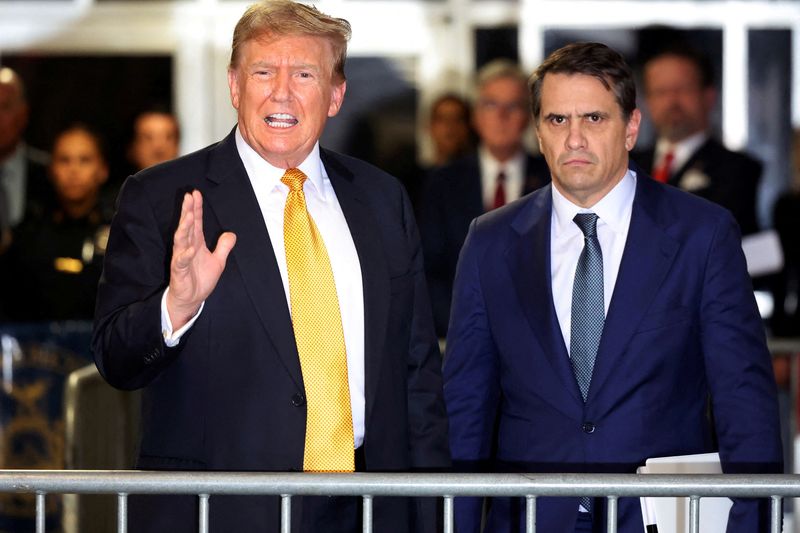By Jack Queen
(Reuters) - Closing arguments are expected on Tuesday in Donald Trump’s criminal hush money trial in New York, wrapping up what is likely to be the only case against the former U.S. president to reach a jury before the November election.
Here is a look at what comes next.
WHAT HAPPENS DURING CLOSING ARGUMENTS?
The defense will present their summations first, followed by prosecutors.
Prosecutors with the Manhattan District Attorney’s Office will seek to convince a dozen New Yorkers that Trump falsified business records to cover up an alleged sexual encounter with porn star Stormy Daniels - a liaison Trump denies.
Prosecutors must prove beyond a reasonable doubt that Trump intentionally made or directed others to make false entries in business records, did so with intent to commit another underlying crime and sought to conceal the commission of that crime. They must also prove the 34 records in question were falsified.
Trump’s lawyers face a lower burden and only need to sow sufficient doubt in jurors’ minds to secure an acquittal, or sway at least one holdout among the 12 to deadlock the jury and trigger a mistrial.
WHAT HAPPENS AFTER CLOSING ARGUMENTS?
The judge overseeing the case, Juan Merchan, will give the jury lengthy instructions on how to interpret the law and evidence during their deliberations.
Jurors will be told that they can only convict Trump if they believe he is guilty beyond a reasonable doubt.
During deliberations, jurors will have access to all of the evidence and be able to ask questions of the judge, who will confer with prosecutors and defense lawyers before deciding how to answer.
WHAT HAPPENS WHEN JURORS REACH A VERDICT?
The verdict must be unanimous, and if the jury deadlocks, Merchan will declare a mistrial.
Once jurors inform the court they have reached a verdict, Merchan will summon the parties to the courtroom to hear it read by the foreperson. Merchan must still affirm the verdict and enter a final judgment. Either side can ask him to effectively overrule the jury.
WHAT HAPPENS IF TRUMP IS CONVICTED?
If Trump is convicted, it would likely be several weeks or months until he is sentenced. As a first-time offender of a nonviolent crime, he would likely be released on bond in the meantime.
It is rare for people with no criminal history who are convicted only of falsification of business records to be sentenced to prison in New York. Punishments like fines or probation are more common.

The maximum sentence for Trump’s crime of falsifying business records is 1-1/3 to four years in prison, but in cases involving prison time, defendants are typically sentenced to a year or less.
(This story has been corrected to say that the defense will present summations first, in paragraph 3)